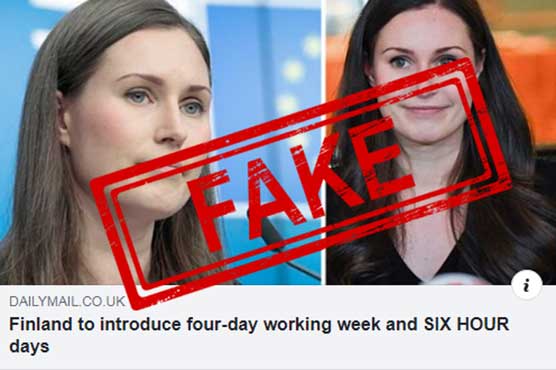Finnish govt refutes news regarding four-day workweek

"The 4-day week is not on the Finnish Govt's agenda", said Finland Twitter.
HELSINKI (AFP) - Media outlets around the world have been reporting that Finland wants to introduce a four-day workweek. But in reality the country’s government has no such plans.
What are we verifying?
Several international media outlets in Britain, the United States and Australia have reported that Finland’s new young prime minister Sanna Marin has announced plans to introduce a four-day workweek, and in some cases a six-hour workday as well.
What do we know?
There is very little validity to these claims and according to the Finnish government itself no such plans exist.
In the Finnish Government´s program there is no mention about 4-day week. Issue is not on the Finnish Government’s agenda. PM @marinsanna envisioned idea briefly in a panel discussion last August while she was the Minister of Transport, and there hasn’t been any recent activity.
— Finnish Government (@FinGovernment) January 7, 2020
"There’s no mention of this in the government’s programme. It is not on the government’s agenda," a government source told AFP in a text message.
The source regretted that "no fact-checking whatsoever" had been attempted.
On Tuesday the government also officially denied the plans in a tweet.
"In the Finnish Government’s programme there is no mention about 4-day week. Issue is not on the Finnish Government’s agenda. PM @marinsanna envisioned idea briefly in a panel discussion last August while she was the Minister of Transport, and there hasn’t been any recent activity," it said.
The 34-year-old Marin’s envisioning of the idea refers to when she attended a panel discussion at the Social Democratic Party’s 120-year anniversary in the city of Turku in August 2019.
"A four day working week, six hour working day, why can’t that be the next step? Is eight hours the final reality? In my opinion people deserve more time with their families, their close ones, with their hobbies and other things in their life. This could be the next step for us in working life," she said while listing things she hoped for in the future.
Most international publications reporting the story refer to an article by Brussels-based publication New Europe, which was published on January 2.
The New Europe article actually makes clear that this is not an official policy of the new government, but merely suggested that Marin could bring up the idea once again now in her new role as prime minister.
In later retellings of the story, that distinction however was not always made clear.
In some reports Marin was described as also planning to shorten the work day to six hours, and references to neighbouring Sweden are made, where allegedly a six-hour workday has been in place since 2015, but this claim is also untrue.
While there are a few isolated examples of companies and public sector workplaces that have experimented with shorter work-days in Sweden, the norm is still an eight-hour day, five days a week.
What can be concluded?
While there is some substance to the claim that Sanna Marin has suggested that a shorter workweek should be a future goal, there is no truth to reports that Finland in any way is preparing to introduce a four-day workweek or shorten the workday.

